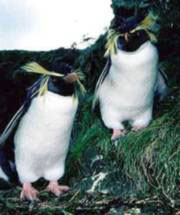Happy Feet’ penguins declining fast in the Falklands
‘Happy Feet’ penguins declining fast in the Falklands
mongabay.com
December 22, 2006
The rockhopper penguin, a species featured in the movie Happy Feet, has taken a suffered a 30 percent population decline over the past five years according to the latest survey figures from Falklands Conservation, a conservation group with offices in Stanley, Falkland Islands and London, England.
The organization, a partner to the UK-based Royal Society for the Protection of Birds (RSPB) within BirdLife International, found that rockhopper penguin numbers have fallen from 298,496 pairs in the islands in 2000 to 210,418 pairs now – almost a 30% decline in five years. In 1932 there may have been as many as 1.5 million breeding pairs, suggesting an 85 percent decline since then. The group says climate change could be the culprit behind the collapse.
 Image courtesy of the Royal Society for the Protection of Birds |
“The decline of the rockhopper penguin in the Falkland Islands suggests a massive shift in the ecology of the Southern Ocean, possibly linked to climate change,” said Geoff Hilton, an RSPB biologist who has studied rockhopper penguins. “It is really alarming that these huge declines – involving the disappearance of literally millions of birds – are happening on islands all round the Southern Ocean, and yet we don’t really know what is going wrong.”
The group said that an algal bloom in 2002-2003 poisoned many of the penguins in the Falkland islands, but some species appear to have recovered. The rockhopper penguin is apparently still struggling.
“Although the factors driving the long-term decline of rockhopper penguins are a little elusive, these survey results show that this species seems unable to bounce back in good years from the population crashes that happen in bad years,” said Nic Huin of Falklands Conservation. “This is gravely worrying for the future of this little bird, which has its most important world population in the Falkland Islands.”
This article is based on a news release from the Royal Society for the Protection of Birds